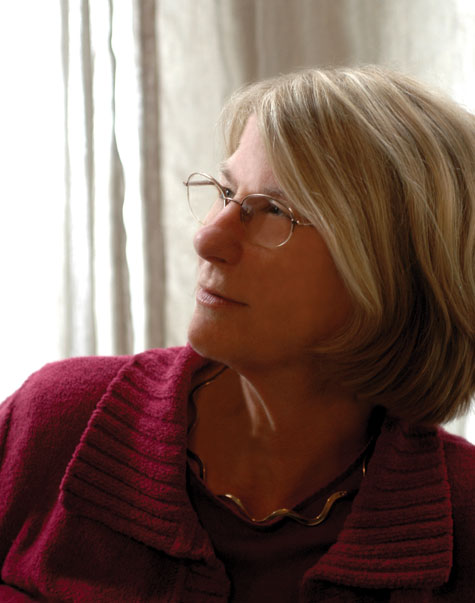
LOOKING DEEPLY WITHIN Maine poet Betsy Sholl.
|
In "The Sea Itself," Betsy Sholl writes of a No said to the storm tide: "...such a total No, it became a kind of Yes,/so the world was suddenly everything at once,/solid and shifty, stormy and calm." It is the opening poem of her magnificent seventh book, Rough Cradle, a volume that widens and transcends boundaries between all manner of elements.
Through wave crests and dump heaps, bare tables and roads, Rough Cradle explores mutability, a fluidity between forms, whether bodies or water, rock or grief. Sholl wends from this tenuousness both anxiety and joy: When, in the backwoods dump of "Gone," briars and iron oxide claim things people once used — mattresses, radiators — she writes of "all that was human/gone feral the dizzy acceleration/looking down that deep well teetering the terror/and thrill of it...." Elsewhere, that transition of thing to other is almost celestial, sensual in its comfort: "If it's all light/in the end," asks "Love Song with Departure," "why not practice now"? "Even stones", it pronounces, "become light."
The transitive nature of all this matter moves Sholl to find glorious nuances and oppositions in the darker places she treads. She renders, for example, striking inversions of loss: In the luminous redemption of "Birdwatching," in which she ponders the double-edged legacies left her by her mother, she wonders whether "a bird/flying off doesn't have to mean gone,/it could mean: look at that bright going."
As she upends perspectives, her powers of synthesis, making god's-eyes of unlike threads, are near deific. In her gorgeous "Transport," those threads are "illegal roads gouged through the rain forest" she hears about on the car radio as she's stopped in road work, along with the specter of Dante, canned by corrupt officials from his job as road superintendent of Florence. All seems grim, caught in an arbitrary equation of damage; she imagines the rain forest birds "dust-drenched in roadside scrub,/grit in their throats, a song lost for each half-mile/of progress, something broken for each thing made...." Roads have been ripped out of green, re-routed, re-paved; hard travel all along. But then, the shift: "Could it be true, all the way to heaven is heaven,/as St. Catherine said? It would take a saint to see that...." And now here's Dante again. He has "conjured a paradise out of pure swoon" through the grime of the streets, "through which he sees/the road in airy shimmers begin to rise." And so have Sholl's disparate elements united to redeem the grudging, grubbing nature of transport, from the moving around of bodies to bodies beatifically moved — and Sholl imparts a ravishing divinity and wisdom in the reversal.
Sholl's music, throughout these transmutations, is rich, pitch-perfect per song, and deliciously varied. Consider her voice in "California Morning," hearing hidden birds, and her own imitative, insistent bird-call urge to "get-it-get-it," to see those twitterers plain. Listen to the jazzy crass patois of "Endless Argument," in which woodland crows scour your trash and figurative wallets are cadged: "Bitch if you want,/but somebody's gonna stick around/come winter.../...and resist,/insist, this grit, these guts — this is it." And the deep-water, concentric tones struck of "Lullaby in Blue": "Child, the world comes in twos, above and below,/visible and unseen. Inside your mother's croon/there's the hum of an old man.../...his instrument made from one/string nailed to a wall, as if anything/can be turned into song...."